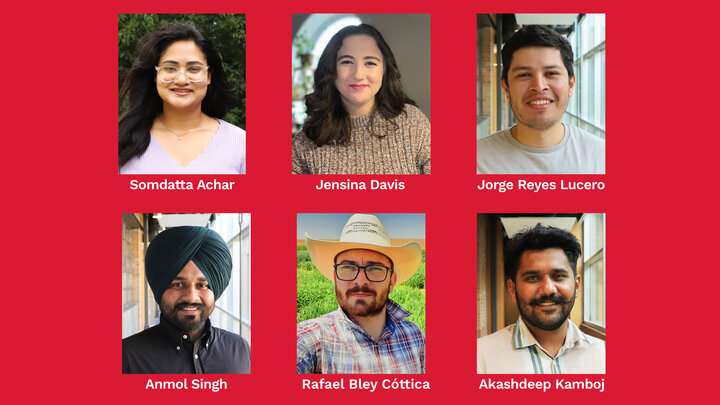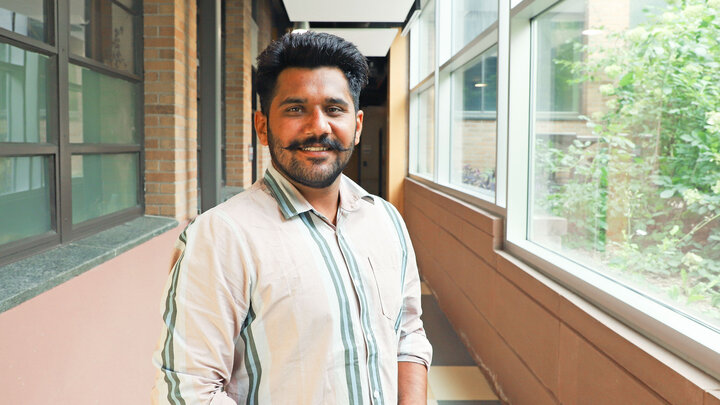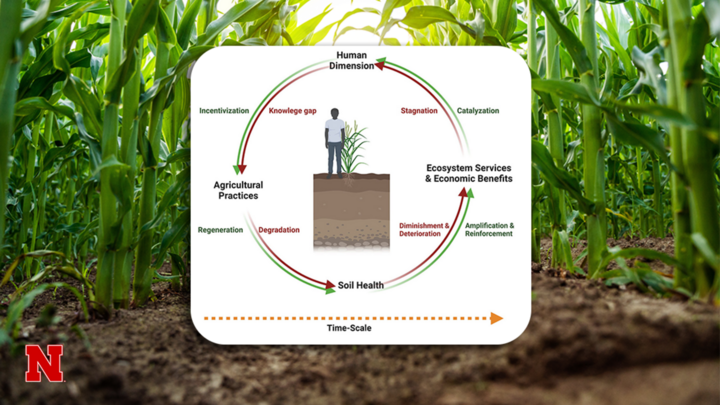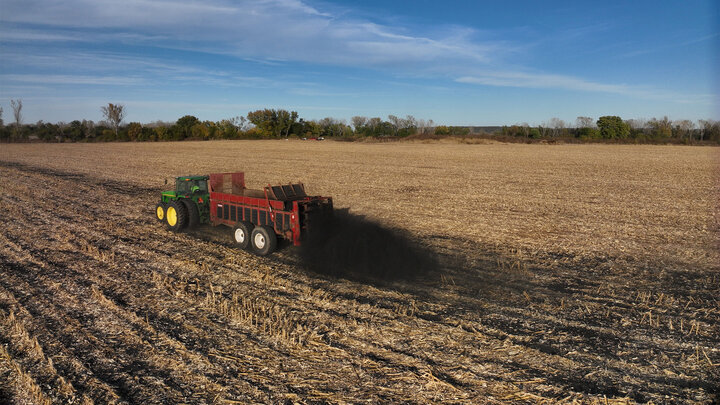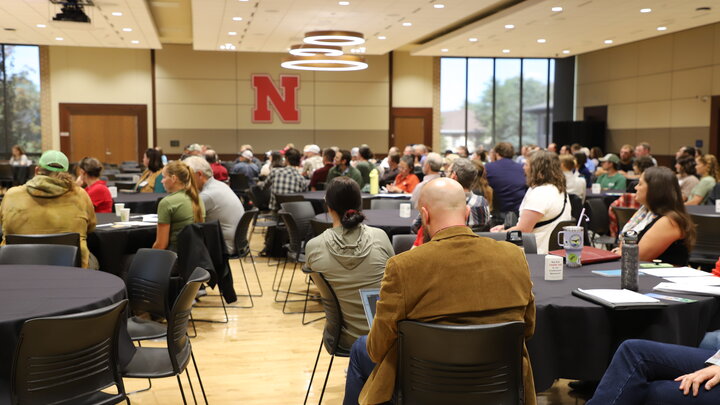Six Department of Agronomy and Horticulture graduate students received fellowships and awards from the University of Nebraska–Lincoln and Crop Science Society of America.
Somdatta Achar, a doctoral student, received the university’s Office of Graduate Studies Chancellor's Fellowship. This fellowship is awarded by the department to newly admitted doctoral or master's students who have excellent academic records and recommendations.
She joined agronomy and horticulture associate professor Andrea Basche’s Resilient Cropping Systems Lab as a doctoral student in 2024.
Achar’s research focuses on important climate-resilient objectives, including the development of best management practices for nitrogen fertilizer in perennial groundcover systems, measurement of soil carbon and nitrous oxide emissions, calculation of the carbon intensity of optimized management systems, and the evaluation of corn residue-based energy supply potential through the analysis of stover yields in perennial groundcover systems.
Jensina Davis, a complex biosystems doctoral candidate specializing in integrated plant biology and a U.S. National Science Foundation Graduate Research Fellow, received the Center for Plant Science Innovation Heuermann Graduate Recognition Award.
A member of Schable Lab, Davis’ research focuses on understanding the interaction between genetics, the environment and management practices of hybrid maize, with a specific focus on nitrogen use efficiency.
She is advised by James Schnable, agronomy and horticulture professor and Nebraska Corn Checkoff Presidential Chair.
Jorge Reyes Lucero, a doctoral student specializing in specialty crops, received the university’s Office of Graduate Studies Othmer Fellowship. This fellowship is awarded to exceptional scholars who are seeking a terminal degree.
Reyes Lucero joined agronomy and horticulture associate professor Sam Wortman’s Grow Local Innovation Lab as a doctoral student in 2025.
His research focuses on expanding digital decision-support tools, such as the Vegetable Variety Navigator, to include additional crops like sweet corn, tomato and potato. The goal is to help specialty crop farmers in Nebraska choose the best varieties for their farms by making publicly available trial data more accessible and valuable. The tool is designed to predict which cultivars are likely to perform well in Nebraska based on relative yield and quality potential.
Reyes Lucero will also be conducting field trials to study genotype-by-management interactions by evaluating the impact of different commercially available plant biostimulants on the performance of various tomato varieties. His third project will be to explore the effects of electrolyzed water as a potential input to reduce both biotic and abiotic stress in plants, with the aim of improving yield.
Anmol Singh, a doctoral student specializing in soil and water science, received the Crop Science Society of America Gerald O. Mott Meritorious Graduate Student Award in Crop Science.
This award is offered by the Crop Science Society of America and recognizes meritorious graduate students pursuing advanced degrees in crop science disciplines. Singh was selected based on his academic achievements, research and teaching contributions, leadership accomplishments, service activities and personal qualifications.
Singh’s research focuses on identifying optimal nitrogen fertilizer sources and their precise placement to maximize crop yield, enhance nitrogen use efficiency and minimize nitrogen losses through leaching, nitrous oxide emissions and ammonia volatilization.
He is advised by agronomy and horticulture assistant professor Javed Iqbal and plans to continue research on nitrogen management strategies after his May 2026 graduation.
The Gerald O. Mott award honors the first CSSA President Gerald O. Mott, who trained 75 graduate students during his 45-year career at Purdue University and the University of Florida. Many of Mott’s students have become eminent forage scientists.
Rafael Bley Cóttica, a doctoral student specializing in plant breeding and genetics, was awarded the distinguished Henry M. Beachell Fellowship. He is a member of agronomy and horticulture assistant professor Katherine Frels’ Small Grains Breeding and Genetics Program.
This fellowship recognizes academic excellence and research potential in the agronomic and horticultural sciences. Beachell, a plant breeder and native Nebraskan, graduated from the department in 1930. He received the 1996 World Food Prize in honor of his contributions in the alleviation of world hunger.
Bley Cóttica’s research focuses on identifying the gene responsible for the resistance and tolerance to the Wheat Streak Mosaic Virus in some varieties of triticale – a cross between wheat and rye. Plans are to cross resistant triticale plants with wheat to get a new gene for WSMV resistance in wheat. A new resistance gene would mean an extra layer of protection against the disease and fewer production losses in the field.
In addition, Bley Cóttica manages the winter barley breeding program with Frels. The program aims to improve overall grain production, winter survival, disease resistance, drought tolerance, and quality characteristics for the grain, grazing, and malting types of barley.
Akashdeep Kamboj, a doctoral student specializing in plant breeding and genetics, received the Henry M. Beachell Fellowship and the Milton Mohr Biotechnology Fellowship.
Kamboj, a member of the university’s Small Grains Breeding and Genetics Program, focuses on using phenomics – observable traits of an organism – and genomics – the complete set of an organism’s DNA – to study yield potential in hybrid wheat. His research combines high-throughput drone-based phenotyping with genomic tools to more efficiently predict yield performance. He has found that hybrid wheat has a better yield advantage over the pure varieties of wheat.
Kamboj has also collected multispectral imagery from hybrid wheat plots across multiple environments and will integrate that data with genotypic information to develop machine learning models that can identify high-yielding and stable hybrids. The goal of this research is to speed up breeding decisions and support the development of climate-resilient hybrid wheat cultivars.
In addition to the fellowship awards, Kamboj earned first-place in the WheatCAP Oral Presentation at the International Plant & Animal Genome Conference in San Diego, California, January 9-14.
He is advised by Frels and agronomy and horticulture professor of practice Blaine Johnson.
The Milton E. Mohr Biotechnology Awards program recognizes outstanding undergraduate and graduate students in the sciences of biotechnology and engineering based on their academic performance and potential for accomplishments in their specific field. This program was established in 1989 for students in the College of Engineering or biotechnology degree programs. The scholarships and fellowships are made possible through an endowment to the University Foundation.
